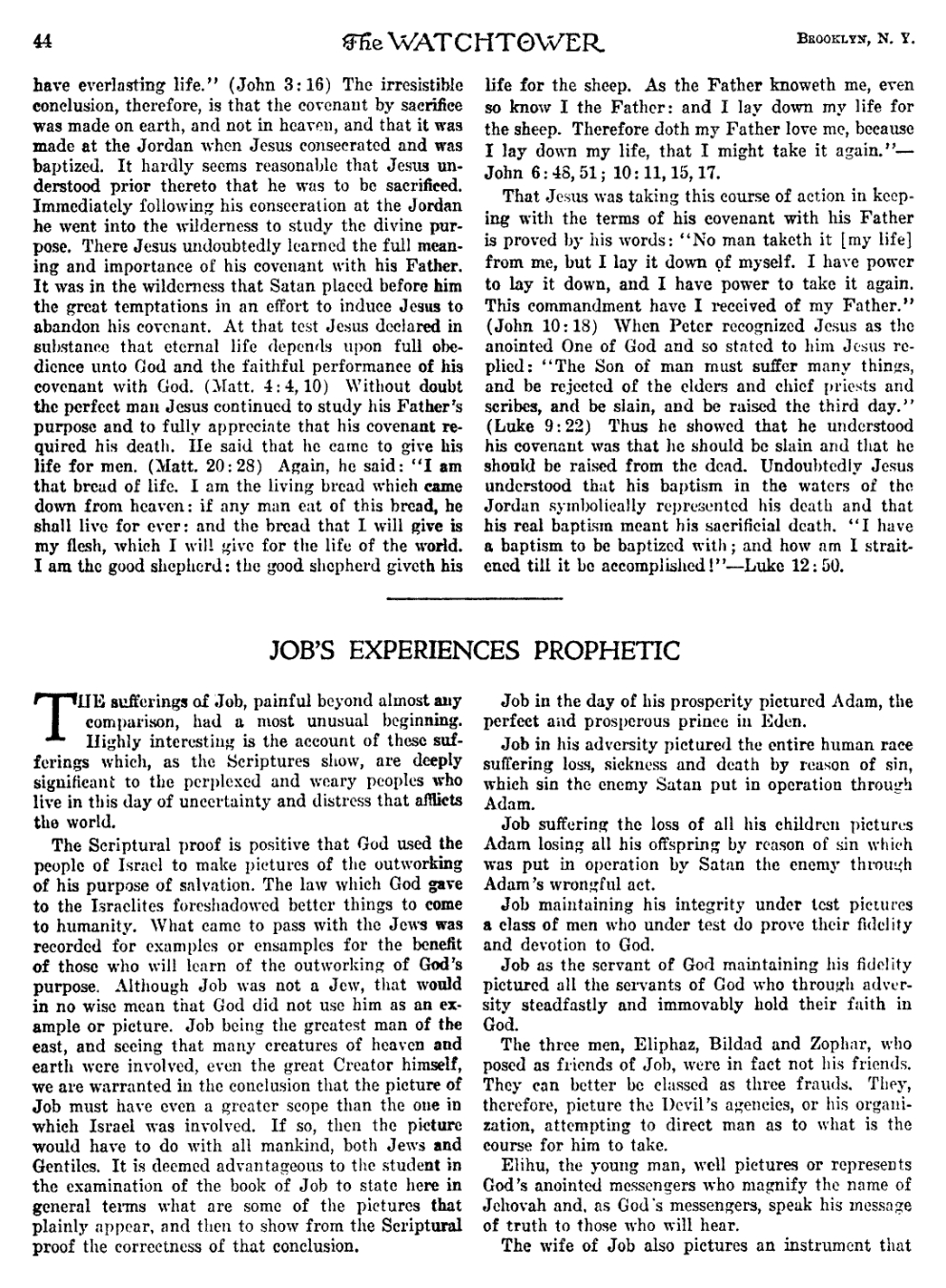44 the WATCHTOWER.
have everlasting life.’’ (John 3:16) The irresistible
conclusion, therefore, is that the covenant by sacrifice
was made on earth, and not in heaven, and that it was
made at the Jordan when Jesus consecrated and was
baptized. It hardly seems reasonable that Jesus un-
derstood prior thereto that he was to be sacrificed.
Immediately following his consecration at the Jordan
he went into the wilderness to study the divine pur-
pose. There Jesus undoubtedly learned the full mean-
ing and importance of his covenant with his Father.
It was in the wilderness that Satan placed before him
the great temptations in an effort to induce Jesus to
abandon his covenant. At that test Jesus declared in
substance that eternal life depends upon full obe-
dicnce unto God and the faithful performanee of his
covenant with God. (Matt. 4:4,10) Without doubt
the perfect man Jesus continued to study his Father’s
purpose and to fully appreciate that his covenant re-
quired his death. He said that he came to give his
life for men. (Matt. 20:28) Again, he said: ‘I am
that bread of life. I am the living bread which eame
down from heaven: if any man eat of this bread, he
shall live for ever: and the bread that I will give is
my flesh, which I wil! give for the life of the world.
I am the good shepherd: the good shepherd giveth his
Brooxiyry, N. ¥.
life for the sheep. As the Father knoweth me, even
so know I the Father: and I lay down my life for
the sheep. Therefore doth my Father love me, because
I Jay down my life, that I might take it again.’’—
John 6: 48,51; 10:11, 15,17.
That Jesus was taking this course of action in keep-
ing with the terms of his covenant with his Father
is proved by his words: ‘‘No man taketh it [my life]
from me, but I lay it down of myself. I have power
to lay it down, and I have power to take it again.
This commandment have I received of my Father.”
(John 10:18) When Peter recognized Jesus as the
anointed One of God and so stated to him Jesus re-
plied: ‘‘The Son of man must suffer many things,
and be rejected of the elders and chief priests and
seribes, and be slain, and be raised the third day.’’
(Luke 9:22) Thus he showed that he understood
his covenant was that he should be slain and that he
should be raised from the dead. Undoubtedly Jesus
understood that his baptism in the waters of the
Jordan symbolically represented his death and that
his real baptism meant his sacrificial death. ‘‘I have
a baptism to be baptized with; and how am I strait-
ened till it be accomplished !’’—Luke 12: 50.
JOB’S EXPERIENCES PROPHETIC
11 sufferings of Job, painful beyond almost any
comparison, had a most unusual beginning.
Highly interesting is the account of these suf-
ferings which, as the Scriptures show, are deeply
signifieant to the perplexed and weary peoples who
live in this day of uncertainty and distress that afflicts
the world.
The Scriptural proof is positive that God used the
people of Israel to make pictures of the outworking
of his purpose of salvation. The law which God gave
to the Israclites foreshadowed better things to come
to humanity. What came to pass with the Jews was
recorded for examples or ensamples for the benefit
of those who will learn of the outworking of God’s
purpose. Although Job was not a Jew, that would
in no wise mean that God did not use him as an ex-
ample or picture. Job being the greatest man of the
east, and seeing that many creatures of heaven and
earth were involved, even the great Creator himself,
we are warranted in the conelusion that the picture of
Job must have even a greater scope than the one in
which Israel was involved. If so, then the picture
would have to do with all mankind, both Jews and
Gentiles. It is deemed advantageous to the student in
the examination of the book of Job to state here in
general terms what are some of the pictures that
plainly appear, and then to show from the Seriptural
proof the correctness of that conclusion.
Job in the day of his prosperity pictured Adam, the
perfeet and prosperous prince in Eden.
Job in his adversity pictured the entire human race
suffering loss, sickness and death by reason of sin,
which sin the enemy Satan put in operation through
Adam.
Job suffering the loss of all his children pictures
Adam losing all his offspring by reason of sin which
was put in operation by Satan the enemy through
Adam’s wrongful act.
Job maintaining his integrity under test pictures
a class of men who under test do prove their fidelity
and devotion to God.
Job as the servant of God maintaining his fidelity
pietured all the servants of God who through adver-
sity steadfastly and immovably hold their faith in
God.
The three men, Eliphaz, Bildad and Zophar, who
posed as friends of Job, were in fact not his friends.
They can better be classed as three frauds. They,
therefore, picture the Devil’s agencies, or his organi-
zation, attempting to direct man as to what is the
course for him to take.
Ehhu, the young man, well pictures or represents
God’s anointed messengers who magnify the name of
Jchovah and, as God's messengers, speak his message
of truth to those who will hear.
The wife of Job also pictures an instrument that
Page:Hope-of-a-tree-1934.djvu/12
Jump to navigation
Jump to search

This page has not been proofread
